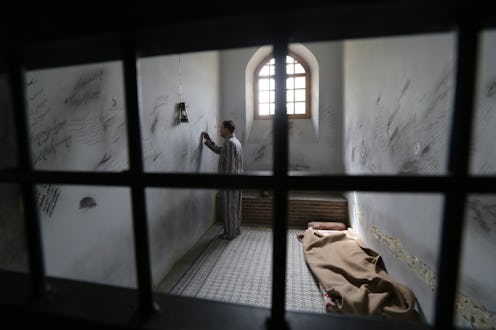News
Troubling Details From Inside An Iranian Prison
Matthew Trevithick graduated from Boston University in 2008. On Jan. 15, 2016, he returned to the United States for the first time after a horrific experience: As a 30-year-old graduate student from Tehran University in Iran, Matthew Trevithick spent 41 days in an Iranian prison.
In 2010, Trevithick flew to Iran for the first time and fell in love with the country, according to the Boston Globe. After Trevithick decided he wanted to return to Iran to teach Farsi — the western Persian language spoken in Iran — he spent five years securing a visa. During that time, Trevithick lived temporarily in Iraq and Istanbul, where he managed a nonpartisan research center. In September 2015, Trevithick finally received a visa and moved to Iran to pursue his dreams. Apparently before his arrest, Trevithick told the Boston Globe that his life was boring in Tehran, as he mostly did mundane things each day, traveling between his dorm room, school, and sometimes a cafe to study.
The prison in which Trevithick spent his time, Evin Prison, is notorious for being one of the worst places, even as a criminal (which Trevithick was not). Fox deemed Evin Prison “Hell on Earth.” The prison reportedly houses 15,000 inmates, ranging from killers to thieves, but has also imprisoned journalists, high-ranking Shiite religious leaders, and academics over the past four decades. It’s difficult to imagine spending extensive time at a place where beatings, tortures, and executions are the norm, but Trevithick did and lived to tell the story. Here are some of the most troubling details from his time at Evin Prison:
41 Days In Captivity
On Dec. 7, 2015, three men in plain clothes picked up Trevithick from the street right outside his dorm, and he was forced inside a white Hyundai Sonata. Trevithick was interrogated by various Iranian officials, who reportedly accused him of living in Iran only to try to overthrow their government. Trevithick tried to reassure them that he was just a student at Tehran University with no intentions of anti-government actions. The Iranian officials didn’t believe him, so Trevithick was held captive for 41 days — from Dec. 7, 2015 to Jan. 15, 2016. The prison guards blindfolded Trevithick, gave him prison clothing, and confiscated his cell phone and computer.
Confined To Ridiculously Small Spaces
Trevithick spent all 41 days locked inside a 6-by-7-foot concrete cell. Most cells in the United States and United Kingdom are 6 feet by 8 feet, which is unacceptably small, but Trevithick’s was even smaller. He spent his time doing sit-ups and push-ups, and he told the Boston Globe that he spent many of his days in solitary confinement. Prisoners who are sentenced to solitary confinement typically spend an average of 23 hours per day in windowless cells with minimal human contact, according to the ACLU. Trevithick described his solitary confinement, clarifying that there was no bed, but only a thin carpet on the ground and that he used a towel for a pillow. He said:
It takes a very intense mental toll on you because it’s such a bizarre experience. You’re alone with your brain. It just feels so permanent. You just realize there’s nothing you can do to get through that cement wall.
Food And Personal Hygiene Restrictions
The prison guards fed Trevithick three meals a day, but the food rations were usually small. For breakfast, they gave Trevithick a hard-boiled egg and a small block of cheese. Lunch and dinner were typically the same meals, usually a traditional Iranian dish of vegetables and rice. As far as personal hygiene, Trevithick was only allowed to shower every four days.
Near-Daily Interrogations
Almost every day, Trevithick says he had to confront the Iranian officials who were convinced he had an ulterior motive for living in their country. They hacked into his email and demanded information about any email Trevithick had sent that included the word “Iran” — some of the emails in question were from decades ago. “Absence of proof becomes proof,” Trevithick told the Boston Globe when referring to the justice system in Iran. Apparently the Iranian officials believed he had strong ties to the U.S. government, as well as access to bank accounts with millions of dollars. However, they had no evidence to back this up, and Trevithick had no evidence to prove this wasn’t true, so they didn’t believe him.
Throughout his stay, Trevithick was eventually removed from solitary confinement and placed in a cell around other inmates. There he said he realized the prison was full of non-criminals: poets, artists, journalists, intellectuals; he even met Jason Rezaian, a journalist from the Washington Post. This week is the first time Trevithick has spoken publicly about his experiences at Evin Prison.
